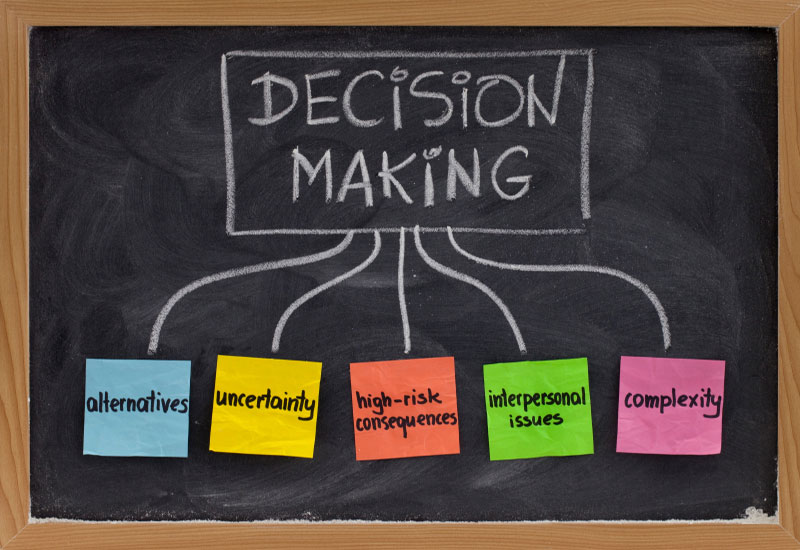Closing the Gap: Moving from Analysis to Decision Making

In fast-paced environment, the ability to make effective decisions is more critical than ever. Whether it be in the workplace, personal affairs, or during stressful situations, the choices we make can significantly impact our outcomes. Yet, numerous people find it difficult with decision-making, often feeling burdened by the vastness of information available or stopped by anxiety of making the incorrect choice. Bridging the gap from analysis to decisive action is essential for achievement, and enhancing decision-making skills can result in more assured and timely results.

Mastering the skill of smart decision-making requires comprehending various methods and structures that cater to both instinctive and analytical approaches. From learning how to make better decisions under stress to acknowledging the importance of EQ, cultivating these skills can enable individuals to navigate challenges successfully. In this article, we will explore proven techniques, the science behind effective decisions, and strategies for addressing common pitfalls like mental exhaustion and paralysis by analysis, all aimed at helping you make decisions that align with your objectives and principles.
Strategies for Effective Decision Making
Effective decision-making starts with the identification of specific goals. To make wise choices, you must recognize what outcome you want. Spend time to articulate your objectives, as this focus will guide your thought process. Whether you are evaluating private choices or strategic decisions, knowing what you want to achieve assists you eliminate options that are misaligned with your goals.
Afterward, consider applying decision-making models that offer a framework to your analysis. These models can help visualize options, weigh their pros and cons, and judge potential outcomes. Techniques like the SWOT model (strengths, weaknesses and challenges, potential gains, threats) can aid in understanding the implications of your selections. By structuring your thoughts systematically, you improve your ability to make well-considered choices reinforced by logic rather than feelings.
In conclusion, remember the importance of emotional awareness in decision-making. Being aware of your emotions and understanding how they influence your choices can markedly improve the standard of your choices. Engage in mindfulness to regulate your feelings, especially under pressure. An acute awareness of both your emotions and those of your peers can foster enhanced collaboration in team environments, leading to more stronger consensus and eventually better outcomes.
Insights into Psychology for Enhanced Decision-Making
Comprehending the psychology behind decision-making can significantly boost your capacity to choose wisely. One important insight is the notion of cognitive biases, which are structured errors in thinking that affect our decision-making. Being mindful of biases like confirmation bias or anchor bias can aid you identify when your judgment may be influenced. By proactively challenging your preconceptions and pursuing diverse viewpoints, you can reduce the effect of these biases and arrive at more knowledgeable decisions.
Emotional intelligence plays a vital role in how we approach decisions, especially in intense situations. Recognizing and managing your feelings can stop fear and overpowering your judgment. When you engage in mindfulness and develop empathy for others' viewpoints, you can tackle decisions with a clearer mind and a more balanced perspective. This emotional awareness not only aids in personal decision-making but also improves group dynamics when collaborative choices are necessary.
Another significant aspect is the power of intuitive thinking, which can be a useful tool in the decision-making process. While analytical thinking is essential for assessing data, intuition allows for quick evaluations based on prior knowledge and instincts. Merging intuition with rational thought can lead to more effective decision results. Teaching your mind to discern when to believe in your instincts and when to rely on careful analysis can ultimately boost your decision-making skills and result in improved results.
## Tactics for Self-assured Decision Making
For making certain decisions it's vital to leverage a combination between analytic strategies plus emotional awareness. Start with outlining a definite framework for decisions that corresponds to your principles and goals. This can involve recognizing the critical elements that matter most to you, evaluating the advantages and disadvantages of each option, and thinking about the extended effects of your decisions. By having a systematic method, you reduce uncertainty plus build a solid foundation to make knowledgeable choices.
Another efficient method is to utilize the strength of pausing. When faced with significant determinations, taking a moment to collect yourself plus consider can lead to more clarity. This method allows you to separate from quick emotional replies plus review possibilities with a more objective mindset. leadership decision-making as awareness or concise moments of reflection in your decision-making approach, because these can elevate thought clarity plus diminish worry, therefore helping you face decisions with increased conviction.
In conclusion, practice reflecting on your decisions, both good and bad. Examining earlier choices offers meaningful lessons to guide your next decisions constructively. Create a routine of reflection, thinking about what succeeded and what could have been improved in your decision-making process. By breaking free from the anxiety of incorrect choices while emphasizing advancement and knowledge, you will cultivate a more confident approach to decision-making across all aspects of your life.
